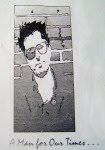Changing Recording Roles
A newb somewhere was hazy on the actual duties and roles of engineer, producer, and mastering engineer...
Traditional roles have broke down as the biz has been flooded by newbs but here are the traditional roles:
Traditional roles have broke down as the biz has been flooded by newbs but here are the traditional roles:
- Producer -- he's the chief executive officer of the project; he's the one with the purse strings; he's often the one who picks the talent and material. In the traditional biz, he worked for a label, typically, often working hand in hand with label A&R (artists and repertoire). He's the chief talent and tech wrangler.
- Engineer -- he's a technician, tasked with keeping the studio running and fulfilling the producer's instructions. He's usually the one with his hands on the controls. In recent years, new roles have developed around specialized editing that was not possible in earlier days, so that you end up with people now who specialize in vocal editing (retuning and re-timing) and drum editing (re-timing).
[Obviously there are many in the industry, particularly in Nashville, who are incredibly bad vocal editors. It's one thing to T-Pain a vocal if the artist and producer want it -- but if the singer wants it to sound natural, I shouldn't think there could be any excuses left for the utterly clumsy and obvious vocal retuning that 'graces' the recordings of many big stars.]
- Mastering Engineer -- traditionally, this was the highly trained technician who did the very difficult task of trying to squeeze as much fidelity (and in the case of singles, particularly in the 50s and 60s, when singles had to compete with each other in jukeboxes and on the radio -- loudness) into the narrow grooves as possible. The variable groove spacing lathes these guys operated were complex, and very tricky to run well. In those days, a mastering house really earned its money.
At first, the bar for mastering in the digital era was very high -- meaning that established mastering houses still had a valuable franchise. But then the advent of the CD-R and other new technological approaches meant that virtually anyone could prepare a CD master for replication -- crisis time in the mastering biz!
But musicians are a gullible and mostly clueless lot. They turned out to be quite easy to gull into continuing to pay as much as hundreds of dollars an hour -- not for the highly technically demanding craft of a disk cutting engineer -- but rather for an extension of the last-emergency-fix-it stop repairs that had long been a possible adjunct to the grooved disk mastering process.
And, with the explosion of inexperienced recordists and shoestring studios there really were problems to be fixed, no question.
Problem was that the right place to fix many of them was back in the mix.
But many in the music biz don't like to let cold-headed reality get in the way to make a buck.
So we had a group of vested interests promoting the quite new idea that tracks had to be "mastered" -- but now, by that misused term, people actually meant a sort of post-facto final sweetening, typically focusing on adding more compression and then trying to fix the dullness that results from overcompression, often by aggressive use of finite impulse response (linear or 'mastering') or other EQ.



0 Comments:
Post a Comment
Subscribe to Post Comments [Atom]
<< Home